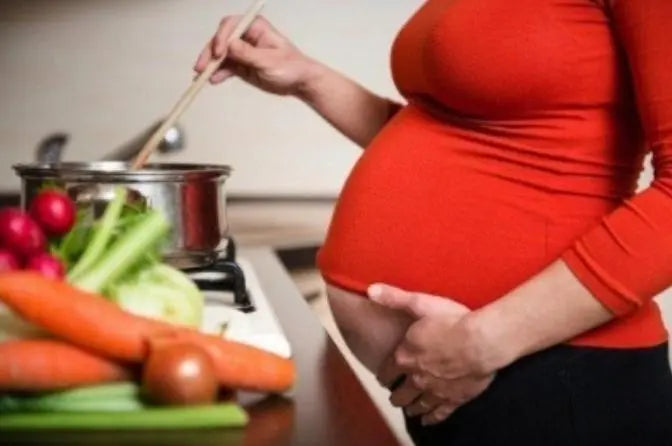
Nutrition During Pregnancy
Nutrition during pregnancy is a very crucial topic that yet has many misconceptions spread by society and social media, so what are its facts and myths?
Pregnancy is a very sensitive and delegate phase that always has varied concepts, so it’s always important to consult a gynecologist for pregnancy-related questions and information.
Therefore, I interviewed Dr. Gaël Abou Ghannam, where we discussed Nutrition during pregnancy from various aspects.
For the full interview about Nutrition During Pregnancy with Dr. Gaël Abou Ghannam, click on this link

Question Number One: Is it true that moms should gain an average of 11-17 Kg during pregnancy as a healthy weight?
The answer is: True, an eleven to eighteen Kg weight gain during pregnancy is normal and recommended, and this average shifts downwards as the weight goes up.
Society has misconceptions about how you should eat during pregnancy, like “eat as if you’re 2 people in one”, which is totally untrue! The truth is, you should keep the same food quantity with an extra of 350 calories during the second trimester and around 450 during the third trimester..
But keep in mind:
Don’t feel ashamed of your gained a little extra weight! Maintain your healthy diet, watch for your food quality, and stay away from junk food!
Question Number Two: Is an extra weight gain dangerous for a pregnant woman (e.g. +30 Kg)?
Of course, a weight excess might cause a higher chance of diabetes, which in return affects the baby’s health, weight and delivery. It also might cause hypertension or even Preeclampsia.
Therefore, it is very important to follow a healthy diet along with an increased physical activity to increase your metabolism.
But watch out to not exhaust and deprive yourself.
Gaining weight during pregnancy is very normal, and it is caused by several factors like excess water, placenta and others. So don’t be misled by social media models to over-exercise or decrease your food portions.
Remember that eating little portions can cause higher chances of miscarriages.
Weight gain is not a competition nor losing weight is a trend!!
Question Number Three: Are there dangers for Keto diet and Intermittent fasting?
For sure! Your body and baby need normal food styles and all nutrients including carbohydrates. It is recommended to have a diet before pregnancy to be our healthiest self while pregnant.
Don’t feel guilty over your cravings or over-stress your weight. Keep it balanced!
Question Number Four: What are the tips on Heartburn and Nausea during the first trimester?
Dr. Gaël Abou Ghannam provided the following tips:
- Limit your food intake into small portions distributed over the day.
- Try eating dry food and avoid high-calorie meals to facilitate your digestion.
- Don’t tame your cravings especially in the first trimester.
- If you can’t eat, try drinking water or juice to substitute your energy loss.
- Take about 1-1.5 g of Ginger to control nausea.
- Avoid Lime, tomatoes, and coffee.
- Have your last meal at least one hour before you sleep.
- Sleep on a higher pillow to control heartburn.
Also, these are some generalized claims:
- Heartburn is associated with excess baby hair.
- Increased nausea is more associated with a baby girl.
- Craving lemon is more associated with a baby boy.
The above points are all Myths and not related to proven scientific facts!
Question Number Five: Do you recommend supplements in the first pregnancy months for moms who can’t eat well?
In the first Trimester: It is recommended to intake Folic Acid to help your baby develop their brain and spinal cord naturally and help you receive your exact needed dose. It is better to have blood tests to make sure there is no present deficit that needs additional supplements. However, try substituting unnecessary supplements with healthy food.
In the second Trimester: Extra Iron supplements are needed to avoid anemia, in addition to calcium, omega 3, and vitamin D. Any additional vitamins and minerals are beneficial as well, but keep your main focus on the ones mentioned first. However, make sure to not take extra supplements and be careful of the over dosage.

Question Number Six: Are there specific food precautions during pregnancy?
Here are the main tips Dr. Gaël has given:
- Wash your fresh vegetables very well and peel when available to avoid having Toxoplasmosis.
- Cook your meat and avoid raw meat or fish.
- Make sure your milk and cheese are pasteurized. It is preferred to get packed dairy products.
- Avoid mayonnaise, cold cuts, tuna, salmon and other raw food.
Question Number Seven: What about mercury in fish?
I receive a lot of complaints when mentioning fish should be eaten twice a week. So what is the fact behind mercury in fish?
The answer is: Fish is not THAT high in mercury. On the contrary, fish is very healthy and essential in your diet twice a week, especially white fish. However, you can avoid too much canned tuna that has higher mercury levels.
Question Number Eight: Concerning a pregnant woman with gestational diabetes and hypertension?
Should she consult an expert, or simply control her carbohydrates intake?
Answer: I personally recommend consulting a dietician that could recommend her the right amount of carbs to take, and what food to avoid.
Question Number Nine: Do you recommend Chicken liver during pregnancy?
As well as it’s well cooked, why not? Chicken liver is rich in vitamins and minerals, so have it as long as it’s in adequate amounts.
Question number ten: Do you recommend Mannitol and Aspartame as sugar substitutes during pregnancy?
NO! If you want to have sugar, it’s better to have actual sugar in small quantities than artificial ones.
Question number eleven: What about Caffeine and Alcohol?
The recommendations are:
For Caffeine: 200 mg of caffeine per day equivalent to 1 cappuccino or café latte. You can also have tea café, decaf, espresso, coke, chocolate, and tea for caffeine intake. Make sure to have a small amount and not several times per day.
For Alcohol: Just one cup on special occasions is FINE. However, I don’t recommend alcohol at all during the pregnancy period.
Question Number twelve: What food should be avoided because it can cause miscarriage?
- Parsley in high amounts (small quantities are OKAY)
- Dates (might cause induction)
However, there are certain Myths: Papaya and Pineapples can cause contractions and miscarriages. These are not true and have no scientific evidence.
Question Number Thirteen: What about smoking?
Whether it’s a Cigarette or Shisha, is it dangerous during pregnancy?
The answer is: Yes! It can cause many problems like early miscarriage or smaller babies. For women who already are smokers, it is recommended to decrease the daily dose as possible for a healthier pregnancy.

Pregnancy is a special occasion, and a foundation of a new life. So you might as well take extra care extra of your and your baby’s health!
We hope this information was helpful!
To view my full interview with Dr. Gaël Abou Ghannam, click on this link
Mirna Sabbagh, an adult and child dietitian, nutritionist, and lactation consultant. She also has several digital courses: Pregnancy Nutrition Course, breastfeeding course, starting solids 6-12 months course, and also child nutrition for all children including picky eaters, that you can sign up for from the comfort of your home.
The courses are pre-recorded. As soon as you make the course purchase, you will receive a link to watch the course from your phone or laptop.
You can also e-mail Mirna for questions on info@mirnaelsabbagh.com
Mirna is no longer doing consultations. Her online courses and webinars cover 95% of parents common concerns.
